How to configure Vue3 routing, perform route jumps and pass parameters?
1. Install the routing
npm i vue-router
2. Write the routing that needs to be displayed
Create the pages folder in the src directory and create it inside The two vue files are named student.vue, person.vue
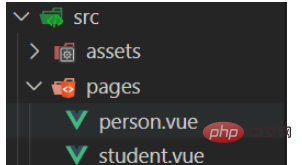
Write two vue files respectively
student.vue and person.vue
<template>
学生
</template>
<script setup>
</script>
<style scoped lang="less">
</style><template> 人类 </template> <script setup> </script> <style scoped lang="less"> </style>
3. Configure routing
Configure the router.js file in the src directory
import { createRouter,createWebHistory } from "vue-router";
const router=createRouter({
history:createWebHistory(),
routes:[
{
component:()=>import('../pages/person.vue'),
name:'person',
path:'/person'
},
{
component:()=>import('../pages/student.vue'),
name:'student',
path:'/student'
},
{
//实现路由重定向,当进入网页时,路由自动跳转到/student路由
redirect:'/student',
path:'/'
}
]
})
export default router3. Use routing
Use routing in main.js
import { createApp } from 'vue'
import App from './App.vue'
import router from './router'
createApp(App).use(router).mount('#app')Display routes in app.vue, use router-link to jump routes, to represents which route to jump to
<template>
<router-view></router-view>
<hr>
<div>
<router-link to="/student">到student路由</router-link>
<br>
<router-link to="/person">到person路由</router-link>
</div>
</template>
<script setup>
</script>
<style scoped>
</style>The effect is as shown in the figure below, click (to student route) or ( to person routing) will perform route jump
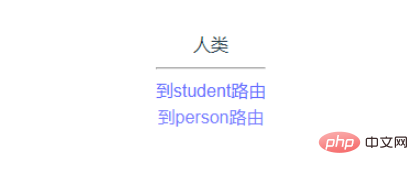
4, programmatic routing
Declarative routing performs route jump through router-link, programmatic routing Implemented through functions
Modify app.vue, vue3 uses a combined API, you need to introduce
useRouter, useRoute, and
const router=useRouter()
const route=useRoute()
<template>
<router-view></router-view>
<hr>
<div>
<button @click="toStudent">到student路由</button>
<br>
<button @click="toPerson">到person路由</button>
</div>
</template>
<script setup>
import {useRouter,useRoute} from 'vue-router'
const router=useRouter()
const route=useRoute()
const toStudent=()=>{
router.push('student')
}
const toPerson=()=>{
router.push('person')
}
</script>
<style scoped>
</style>Route hop through router.push Transfer
Use router router between routes, and use toute route for the current route
The result is as shown in the figure below, realizing programmatic route jump
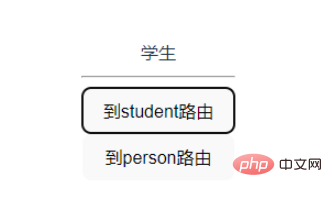
If no alias is set when configuring routing, you need to jump through the router.push configuration object
const toStudent=()=>{
router.push({
path:'/student'
})
}
const toPerson=()=>{
router.push({
path:'/person'
})
}5. Routing parameters
5. 1Query parameter transfer
Pass the id and name to the student route
const toStudent=()=>{
router.push({
path:'/student',
query:{
id:1,
name:'张三'
}
})
}The student route receives the query parameter
<template>
学生组件
<div>{{data.query}}</div>
</template>
<script setup>
import { reactive } from 'vue';
import {useRouter,useRoute} from 'vue-router'
const route=useRoute()
let data=reactive({
query: route.query
})
</script>The effect is as shown in the figure below
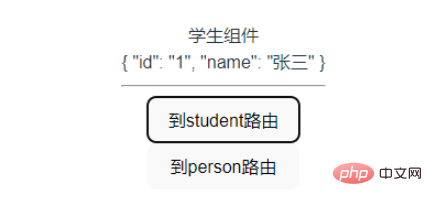
5, 2 Pass params parameters
Assuming that params parameters are passed to person routing, they need to be modified during routing configuration
You need to use name to pass params parameters Specify the route
const toPerson=()=>{
router.push({
name:'person',
params:{
keyword:2
}
})
}At the same time, the routing configuration needs to be modified. Assuming that the keyword is passed,
needs to use placeholders and keywords in the path
? Indicates that it can be passed or not
{
component:()=>import('../pages/person.vue'),
name:'person',
path:'/person/:keyword?'
},Receive params parameter in person.vue
<template>
人类组件
<div>{{data.params.keyword}}</div>
</template>
<script setup>
import { reactive } from 'vue';
import {useRouter,useRoute} from 'vue-router'
const route=useRoute()
let data=reactive({
params: route.params
})
</script>The effect is as follows
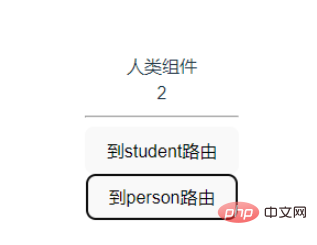
6 , Sub-routing configuration
Add sub-components (stu1, stu2 components) to the student route
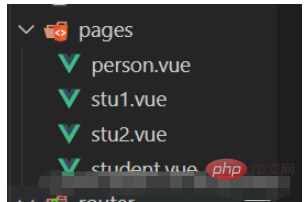
The path of the sub-component does not contain /
{
component:()=>import('../pages/student.vue'),
name:'student',
path:'/student',
children:[
{
path:'stu1',
name:'stu1',
component:()=>import('../pages/stu1.vue')
},
{
path:'stu2',
name:'stu2',
component:()=>import('../pages/stu2.vue')
},
{
path:'',
component:()=>import('../pages/stu1.vue')
}
]
}Write stu1 component
<template> stu1 </template> <script setup> </script> <style scoped lang="less"> </style>
Write stu2 component
<template> stu2 </template> <script setup> </script> <style scoped lang="less"> </style>
Display subcomponents in the student component
<template>
学生组件
<div>{{data.query}}</div>
子组件展示
<router-view></router-view>
<router-link to="/student/stu1">到stu1</router-link>
<router-link to="/student/stu2">到stu2</router-link>
</template>
<script setup>
import { reactive } from 'vue';
import {useRouter,useRoute} from 'vue-router'
const route=useRoute()
let data=reactive({
query: route.query
})
</script>By using router -link for routing jump, you can also jump through programmatic routing
to="/student/stu1" You need to use the complete path to jump
Show results
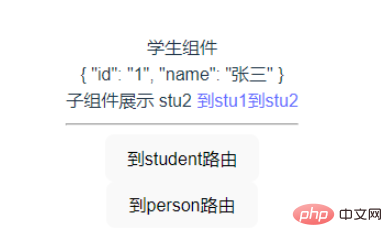
The above is the detailed content of How to configure Vue3 routing, perform route jumps and pass parameters?. For more information, please follow other related articles on the PHP Chinese website!

Hot AI Tools

Undresser.AI Undress
AI-powered app for creating realistic nude photos

AI Clothes Remover
Online AI tool for removing clothes from photos.

Undress AI Tool
Undress images for free

Clothoff.io
AI clothes remover

Video Face Swap
Swap faces in any video effortlessly with our completely free AI face swap tool!

Hot Article

Hot Tools

Notepad++7.3.1
Easy-to-use and free code editor

SublimeText3 Chinese version
Chinese version, very easy to use

Zend Studio 13.0.1
Powerful PHP integrated development environment

Dreamweaver CS6
Visual web development tools

SublimeText3 Mac version
God-level code editing software (SublimeText3)

Hot Topics
 1386
1386
 52
52
 vue3+vite: How to solve the error when using require to dynamically import images in src
May 21, 2023 pm 03:16 PM
vue3+vite: How to solve the error when using require to dynamically import images in src
May 21, 2023 pm 03:16 PM
vue3+vite:src uses require to dynamically import images and error reports and solutions. vue3+vite dynamically imports multiple images. If vue3 is using typescript development, require will introduce image errors. requireisnotdefined cannot be used like vue2 such as imgUrl:require(' .../assets/test.png') is imported because typescript does not support require, so import is used. Here is how to solve it: use awaitimport
 How to use tinymce in vue3 project
May 19, 2023 pm 08:40 PM
How to use tinymce in vue3 project
May 19, 2023 pm 08:40 PM
tinymce is a fully functional rich text editor plug-in, but introducing tinymce into vue is not as smooth as other Vue rich text plug-ins. tinymce itself is not suitable for Vue, and @tinymce/tinymce-vue needs to be introduced, and It is a foreign rich text plug-in and has not passed the Chinese version. You need to download the translation package from its official website (you may need to bypass the firewall). 1. Install related dependencies npminstalltinymce-Snpminstall@tinymce/tinymce-vue-S2. Download the Chinese package 3. Introduce the skin and Chinese package. Create a new tinymce folder in the project public folder and download the
 How to refresh partial content of the page in Vue3
May 26, 2023 pm 05:31 PM
How to refresh partial content of the page in Vue3
May 26, 2023 pm 05:31 PM
To achieve partial refresh of the page, we only need to implement the re-rendering of the local component (dom). In Vue, the easiest way to achieve this effect is to use the v-if directive. In Vue2, in addition to using the v-if instruction to re-render the local dom, we can also create a new blank component. When we need to refresh the local page, jump to this blank component page, and then jump back in the beforeRouteEnter guard in the blank component. original page. As shown in the figure below, how to click the refresh button in Vue3.X to reload the DOM within the red box and display the corresponding loading status. Since the guard in the component in the scriptsetup syntax in Vue3.X only has o
 How Vue3 parses markdown and implements code highlighting
May 20, 2023 pm 04:16 PM
How Vue3 parses markdown and implements code highlighting
May 20, 2023 pm 04:16 PM
Vue implements the blog front-end and needs to implement markdown parsing. If there is code, it needs to implement code highlighting. There are many markdown parsing libraries for Vue, such as markdown-it, vue-markdown-loader, marked, vue-markdown, etc. These libraries are all very similar. Marked is used here, and highlight.js is used as the code highlighting library. The specific implementation steps are as follows: 1. Install dependent libraries. Open the command window under the vue project and enter the following command npminstallmarked-save//marked to convert markdown into htmlnpmins
 How to solve the problem that after the vue3 project is packaged and published to the server, the access page displays blank
May 17, 2023 am 08:19 AM
How to solve the problem that after the vue3 project is packaged and published to the server, the access page displays blank
May 17, 2023 am 08:19 AM
After the vue3 project is packaged and published to the server, the access page displays blank 1. The publicPath in the vue.config.js file is processed as follows: const{defineConfig}=require('@vue/cli-service') module.exports=defineConfig({publicPath :process.env.NODE_ENV==='production'?'./':'/&
 How to select an avatar and crop it in Vue3
May 29, 2023 am 10:22 AM
How to select an avatar and crop it in Vue3
May 29, 2023 am 10:22 AM
The final effect is to install the VueCropper component yarnaddvue-cropper@next. The above installation value is for Vue3. If it is Vue2 or you want to use other methods to reference, please visit its official npm address: official tutorial. It is also very simple to reference and use it in a component. You only need to introduce the corresponding component and its style file. I do not reference it globally here, but only introduce import{userInfoByRequest}from'../js/api' in my component file. import{VueCropper}from'vue-cropper&
 How to use vue3+ts+axios+pinia to achieve senseless refresh
May 25, 2023 pm 03:37 PM
How to use vue3+ts+axios+pinia to achieve senseless refresh
May 25, 2023 pm 03:37 PM
vue3+ts+axios+pinia realizes senseless refresh 1. First download aiXos and pinianpmipinia in the project--savenpminstallaxios--save2. Encapsulate axios request-----Download js-cookienpmiJS-cookie-s//Introduce aixosimporttype{AxiosRequestConfig ,AxiosResponse}from"axios";importaxiosfrom'axios';import{ElMess
 How to use Vue3 reusable components
May 20, 2023 pm 07:25 PM
How to use Vue3 reusable components
May 20, 2023 pm 07:25 PM
Preface Whether it is vue or react, when we encounter multiple repeated codes, we will think about how to reuse these codes instead of filling a file with a bunch of redundant codes. In fact, both vue and react can achieve reuse by extracting components, but if you encounter some small code fragments and you don’t want to extract another file, in comparison, react can be used in the same Declare the corresponding widget in the file, or implement it through renderfunction, such as: constDemo:FC=({msg})=>{returndemomsgis{msg}}constApp:FC=()=>{return(




